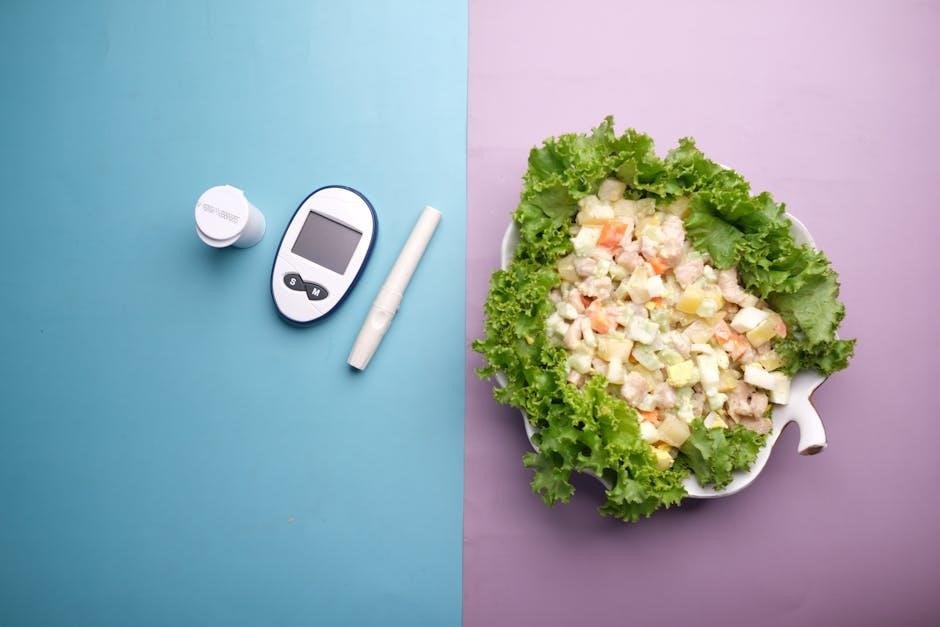Insulin resistance is a precursor to diabetes‚ managed effectively through dietary changes. A well-structured diet plan emphasizing whole foods helps regulate blood sugar and enhances overall health.
What is Insulin Resistance?
Insulin resistance occurs when the body’s cells fail to respond effectively to insulin‚ a hormone produced by the pancreas that regulates blood sugar levels. This condition prevents glucose from entering cells efficiently‚ leading to elevated blood sugar levels. Over time‚ it can progress to type 2 diabetes if left unmanaged. Insulin resistance is often linked to excess weight‚ physical inactivity‚ and a diet high in processed foods and sugars. Early intervention through dietary and lifestyle changes is crucial to improving insulin sensitivity and preventing complications. Understanding this condition is the first step toward implementing an effective insulin resistance diet plan to restore metabolic health and manage blood glucose levels naturally.
The Role of Diet in Managing Insulin Resistance
Diet plays a central role in managing insulin resistance by directly impacting blood sugar levels and insulin sensitivity. A well-designed diet plan helps regulate glucose uptake‚ reducing the strain on the pancreas. Emphasizing whole‚ unprocessed foods like vegetables‚ lean proteins‚ and whole grains can improve insulin function. Reducing intake of sugary and processed foods minimizes blood sugar spikes‚ while healthy fats and fiber promote sustained energy and satiety. By focusing on nutrient-dense meals‚ individuals can restore metabolic balance‚ enhancing insulin efficiency and lowering the risk of diabetes. A structured diet plan not only aids in managing insulin resistance but also supports overall health and well-being.

Key Components of an Insulin Resistance Diet Plan
A successful insulin resistance diet focuses on whole‚ unprocessed foods‚ balanced macronutrients‚ and reduced sugar intake‚ promoting stable blood sugar levels and improved insulin function.
Focus on Whole‚ Unprocessed Foods
Emphasizing whole‚ unprocessed foods is central to managing insulin resistance. These foods‚ such as vegetables‚ whole grains‚ lean proteins‚ and healthy fats‚ are rich in nutrients and fiber‚ which slow digestion and prevent rapid blood sugar spikes. By avoiding processed foods‚ added sugars‚ and artificial ingredients‚ individuals can improve insulin sensitivity and stabilize blood glucose levels. Incorporating plant-based options‚ like legumes and nuts‚ further supports metabolic health. Prioritizing real‚ unprocessed foods helps maintain a balanced diet and promotes long-term weight management‚ both of which are critical for overcoming insulin resistance.
- Include vegetables‚ whole grains‚ and lean proteins in meals.
- Limit processed foods and added sugars.
- Consult a dietitian for personalized meal planning.
- Focus on high-fiber carbs for steady energy.
- Incorporate lean proteins to regulate hunger.
- Add healthy fats to support metabolic function.
- Eliminate sugary drinks and refined carbs.
- Choose whole foods to avoid inflammation.
- Limit processed snacks and fast food.
- Day 1: Avocado toast with eggs‚ grilled chicken salad‚ roasted vegetables.
- Day 2: Oatmeal with nuts‚ lean turkey wrap‚ quinoa stir-fry.
- Day 3: Greek yogurt parfait‚ baked salmon‚ steamed broccoli.
- Day 4: Veggie omelet‚ lentil soup‚ grilled shrimp with brown rice.
- Day 5: Smoothie bowl‚ chicken stir-fry‚ roasted sweet potatoes.
- Day 6: Whole-grain pancakes‚ tuna salad‚ grilled asparagus.
- Day 7: Scrambled eggs with spinach‚ chickpea salad‚ baked cod.
Macronutrient Balance: Carbohydrates‚ Proteins‚ and Fats
Achieving the right balance of carbohydrates‚ proteins‚ and fats is crucial for managing insulin resistance. Carbohydrates‚ particularly high-fiber options like whole grains and vegetables‚ provide sustained energy without causing blood sugar spikes. Proteins‚ such as lean poultry‚ fish‚ and legumes‚ help regulate hunger and insulin levels. Healthy fats‚ including avocados‚ nuts‚ and olive oil‚ support overall metabolic health. The ideal macronutrient ratio varies‚ but many recommend 40-50% carbs‚ 25-30% protein‚ and 20-25% fats. Balancing these nutrients ensures stable blood sugar levels and improves insulin sensitivity‚ aiding in weight management and overall health.
Reducing Sugar and Processed Food Intake
Minimizing sugar and processed foods is essential for managing insulin resistance. These foods cause rapid blood sugar spikes‚ worsening insulin sensitivity. Cutting down on sugary beverages like sodas and juices‚ along with refined carbohydrates‚ helps stabilize blood glucose levels. Opting for whole‚ unprocessed foods such as vegetables‚ fruits‚ and whole grains reduces inflammation and promotes better insulin function. Limiting intake of packaged snacks and fast food also supports weight management and improves overall metabolic health. By eliminating these high-sugar‚ high-sodium foods‚ individuals can better regulate their blood sugar and enhance insulin sensitivity‚ leading to improved health outcomes.

Meal Planning Strategies
Effective meal planning involves creating a structured eating schedule‚ balancing macronutrients‚ and prioritizing nutrient-dense foods. Regular meals help stabilize blood sugar and improve insulin sensitivity over time.
Creating a Personalized Meal Plan
A personalized meal plan is tailored to individual dietary needs‚ preferences‚ and health goals‚ ensuring sustainable management of insulin resistance. It focuses on balancing macronutrients‚ with an emphasis on whole‚ unprocessed foods. The plan considers carbohydrate intake‚ protein sources‚ and healthy fats to stabilize blood sugar levels. Consulting a registered dietitian or nutritionist is crucial to create a customized approach that aligns with lifestyle and medical requirements. Regular adjustments based on blood sugar tracking and weight changes ensure the plan remains effective. A well-crafted meal plan not only addresses insulin resistance but also promotes overall metabolic health and long-term well-being.
Importance of Regular Eating Schedules
Regular eating schedules play a vital role in managing insulin resistance by stabilizing blood sugar levels. Consistent meal times help regulate metabolic function‚ preventing spikes and dips in glucose. Skipping meals can lead to overeating and poor food choices‚ exacerbating insulin resistance. A structured eating plan ensures balanced nutrition throughout the day‚ supporting optimal insulin sensitivity. Additionally‚ regular meals aid in maintaining energy levels and reducing cravings for unhealthy snacks. Adhering to a routine also makes tracking blood sugar levels more accurate‚ enabling better management of the condition. Over time‚ this consistency contributes to improved metabolic health and a reduced risk of developing type 2 diabetes.
Breakfast and Blood Glucose Management
Breakfast plays a crucial role in managing blood glucose levels‚ especially for individuals with insulin resistance. Starting the day with a balanced meal helps stabilize blood sugar and prevents mid-morning spikes. A breakfast rich in whole‚ unprocessed foods‚ such as whole grains‚ proteins‚ and healthy fats‚ supports insulin sensitivity. Incorporating foods like eggs‚ avocado‚ and whole grain toast provides sustained energy and regulates glucose metabolism. Avoiding sugary or refined foods is essential to prevent insulin surges. Additionally‚ pairing carbohydrates with protein and fiber helps slow digestion‚ maintaining steady blood glucose levels. A well-planned breakfast sets the foundation for better blood sugar control throughout the day‚ improving overall metabolic health and insulin function.

Sample 7-Day Insulin Resistance Diet Plan
A 7-day insulin resistance diet plan offers a structured approach to managing blood glucose through balanced meals. Each day focuses on whole foods‚ lean proteins‚ and healthy fats‚ ensuring a variety of flavors while prioritizing nutrient-dense options. The plan is designed to be adaptable‚ catering to different preferences and dietary needs‚ while maintaining a focus on improving insulin sensitivity and overall metabolic health. It provides clear meal ideas and recipes‚ making it easier to incorporate healthy eating habits into daily life.
Day 1-7 Meal Ideas and Recipes
Each day includes balanced meals designed to regulate blood glucose and improve insulin sensitivity.
Recipes focus on whole foods‚ lean proteins‚ and healthy fats‚ ensuring variety and flavor while promoting metabolic health.
Incorporating Vegetables‚ Fruits‚ and Whole Grains
Vegetables‚ fruits‚ and whole grains are foundational in an insulin resistance diet. They provide essential fiber‚ vitamins‚ and minerals while stabilizing blood sugar. Aim for a variety of colorful vegetables like broccoli‚ spinach‚ and bell peppers‚ which are rich in antioxidants. Fruits such as berries‚ apples‚ and pears offer natural sweetness with fiber. Whole grains like quinoa‚ brown rice‚ and oats provide sustained energy. Incorporate these into meals to enhance satiety and improve insulin sensitivity. Pair fruits with nuts or yogurt for balanced snacks. Prioritize seasonal and organic options when possible to maximize nutritional benefits and minimize pesticide exposure‚ ensuring a well-rounded and nutritious diet plan.
Healthy Protein Sources: Fish‚ Lean Poultry‚ and Legumes
Fish‚ lean poultry‚ and legumes are excellent protein sources in an insulin resistance diet. Fatty fish like salmon and mackerel provide omega-3 fatty acids‚ which support heart health and reduce inflammation. Lean poultry‚ such as chicken and turkey‚ offers high-quality protein with minimal saturated fat. Legumes‚ including lentils‚ chickpeas‚ and black beans‚ are rich in protein‚ fiber‚ and complex carbohydrates‚ helping to stabilize blood sugar levels. These proteins are versatile and can be incorporated into meals through grilling‚ baking‚ or adding to salads. Aim for moderate portions and pair them with vegetables or whole grains for a balanced meal. This approach supports blood sugar control and overall metabolic health‚ making them a cornerstone of an insulin-friendly diet.

Lifestyle Modifications for Insulin Sensitivity
Regular physical activity‚ weight loss‚ and behavioral changes are crucial for improving insulin sensitivity. These modifications complement dietary adjustments‚ promoting better blood sugar control and long-term metabolic health.
Exercise and Physical Activity Recommendations
Regular physical activity is essential for improving insulin sensitivity. Aim for at least 150 minutes of moderate-intensity aerobic exercise‚ such as brisk walking or cycling‚ per week. Incorporate strength-training workouts two to three times weekly to build muscle mass‚ which enhances glucose uptake. High-intensity interval training (HIIT) can also be beneficial for insulin function. Consistency is key‚ as exercise helps the body use insulin more effectively‚ reducing blood sugar levels. Pairing physical activity with a balanced diet amplifies its benefits. Even small increases in daily movement‚ such as walking after meals‚ can positively impact insulin resistance. Consult a healthcare provider to tailor a fitness plan to your needs.
Weight Loss and Its Impact on Insulin Resistance
Weight loss plays a significant role in improving insulin sensitivity. Even a modest reduction of 5-10% of body weight can enhance glucose uptake and lower blood sugar levels. Excess weight‚ particularly around the abdomen‚ contributes to insulin resistance by promoting inflammation and fat accumulation in the liver and muscles. Losing weight through a combination of diet and exercise helps reduce fat stores‚ improving the body’s ability to use insulin effectively. This‚ in turn‚ lowers the risk of developing type 2 diabetes and other metabolic disorders. Maintaining a healthy weight long-term is crucial for sustaining these benefits and overall metabolic health.
Behavioral Changes for Long-Term Success
Adopting sustainable behavioral changes is essential for managing insulin resistance effectively. Developing a consistent eating schedule and prioritizing whole‚ unprocessed foods help regulate blood glucose levels. Mindful eating practices‚ such as avoiding distractions during meals‚ can improve digestion and portion control. Regular physical activity‚ including strength training and cardio‚ enhances insulin sensitivity. Tracking progress through food diaries or mobile apps fosters accountability and helps identify patterns. Building a support network and setting realistic goals ensure long-term adherence to dietary and lifestyle modifications. These habits‚ when integrated into daily life‚ promote lasting improvements in metabolic health and overall well-being.
Monitoring and Adjusting Your Diet Plan
Regularly tracking blood sugar levels and food intake helps identify patterns and areas for improvement. Adjustments to the diet plan should be based on progress and health goals.
Tracking Blood Sugar Levels
Monitoring blood sugar levels is crucial for managing insulin resistance. Regular testing helps identify how different foods affect your glucose levels‚ enabling informed dietary adjustments. Aim to test blood sugar levels at key times‚ such as before meals and two hours after eating‚ to track patterns and trends. Keeping a log of your readings can provide valuable insights and help refine your meal plan. By understanding how your body responds to specific foods‚ you can make smarter choices to stabilize blood glucose and improve insulin sensitivity. Consistent monitoring also allows for timely adjustments to your diet‚ ensuring long-term success in managing insulin resistance effectively.
Consulting a Registered Dietitian or Nutritionist
Consulting a registered dietitian or nutritionist is essential for creating a personalized insulin resistance diet plan. These professionals specialize in designing tailored meal plans that address specific dietary needs and health goals. They can help you understand how different foods impact your blood sugar levels and provide expert recommendations to optimize your diet. A dietitian can also guide you in setting realistic goals‚ monitoring progress‚ and making adjustments as needed. Their expertise ensures you receive evidence-based advice‚ helping you manage insulin resistance effectively and sustainably. Regular consultations can also help you stay motivated and accountable‚ making it easier to maintain long-term lifestyle changes for better metabolic health.
The Benefits of an Insulin Resistance Diet Plan
An insulin resistance diet plan offers numerous benefits‚ including improved blood sugar regulation‚ enhanced insulin sensitivity‚ and better weight management. By focusing on whole‚ nutrient-dense foods‚ individuals can reduce their risk of developing type 2 diabetes and other chronic conditions. This dietary approach also promotes sustainable weight loss‚ boosts energy levels‚ and supports overall metabolic health. Additionally‚ it helps lower inflammation and improves cardiovascular health‚ contributing to a longer‚ healthier life. A well-structured insulin resistance diet plan not only addresses immediate health concerns but also fosters long-term wellness by encouraging mindful eating and balanced nutrition.
Final Thoughts on Managing Insulin Resistance Through Diet
Managing insulin resistance through diet is a powerful and sustainable approach to improving health. By adopting a personalized diet plan rich in whole‚ unprocessed foods and minimizing sugar and processed items‚ individuals can enhance insulin sensitivity and regulate blood sugar levels. Consistency and patience are key‚ as reversing insulin resistance is a gradual process. Consulting a registered dietitian or nutritionist can provide tailored guidance‚ ensuring the diet aligns with individual needs. The long-term benefits of such a diet include reduced risk of chronic diseases‚ improved energy levels‚ and overall well-being. Commitment to these dietary changes can lead to significant improvements in metabolic health and quality of life.
